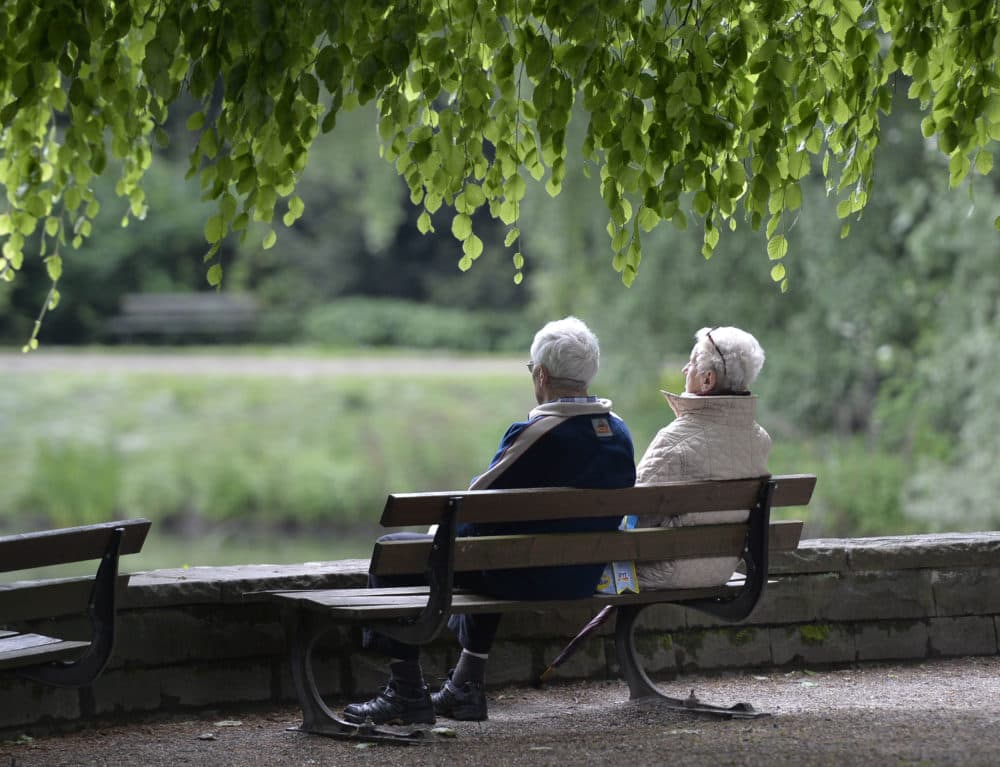Advertisement
commentary
At Life's End, The Gift Of Intimacy

I met Charles, a self-proclaimed foodie, while he was being treated for esophageal cancer. The tumor had narrowed his esophagus, making it hard to enjoy his chipotle-rubbed steaks. He had lost 30 pounds in a few months and had constant throat pain and nausea.
As his palliative care doctor, I helped make his pain and nausea tolerable during his increasingly frequent hospital admissions. Unfortunately, his cancer progressed despite aggressive treatment. He no longer had the strength to work or drive. He stopped gardening because he didn’t have the stamina to kneel, dig and sow seeds. His hikes through the woods became traipses around the house with a walker.
I often ask my patients with life-threatening illness to define their goals. What would be most important to them if time were short? Charles’s answer was emphatic.
“I don’t want to be a burden to my wife,” he said. “If I can’t eat or poop or get out of bed, use the morphine drip. Let me go." Many patients tell me something very similar. It’s as though the possibility of dependence is harder to cope with than the possibility of dying.
As the cancer spread, it limited Charles to eating only pureed food. Then he needed a commode placed next to his bed. Eventually, he was completely bedridden and very thin, barely a lump under the covers. One day, during a home visit, I stood at the bedroom threshold, watching his wife Ellen grab a diaper, slide it under the soiled one, clean Charles with wet wipes. She chucked the soiled diaper in the trash and combed her fingertips through his wispy hair. This was exactly what Charles didn’t want — lingering like an unwanted guest in his own home.
It’s as though the possibility of dependence is harder to cope with than the possibility of dying.
As a palliative care doctor, I have learned it is the lucky few who drive themselves to work one day, and then die peacefully in their sleep that night. For most people, dying is some version of Charles’ experience. For some cancer patients, like Charles, the change is rapid.
During the home visit, Ellen pulled me aside and shared her struggles. She had not been sleeping. She drifted in the shallows of sleep, surfacing frequently to scan the baby monitor for moaning or grimacing, signs that Charles needed more pain medications. During the two hours each day when the home health aide watched Charles, she rushed from the grocery store to the pharmacy and then to the bank, before speeding home to ward off an impending crisis.
Ellen told me that despite her exhaustion and sadness, there was still intimacy. For Ellen and Charles, this was the most uninterrupted time they'd had together since the birth of their children nearly half a century ago. Those early mornings once defined by ironing collared shirts, hissing tea kettles and clamoring kids were a distant memory. These mornings, she perches on her overstuffed armchair spoon-feeding Charles his favorite homemade vanilla custard. When he is done, she dabs his mouth clean, and then reclines in her chair, turning her attention to the muted morning TV show. His bony fingers search till they find hers, and the two doze off together. I frequently find them together like this, their hands entwined.
His bony fingers search till they find hers, and the two doze off together.
These moments are not unique to Ellen and Charles. I have witnessed them among so many of my patients. On afternoon rounds I saw a woman cuddling in the hospital bed with her husband, her legs enveloped by his. In clinic, an otherwise stoic father got choked up as he told me that in a life marked by accolades, his greatest accomplishment, his proudest achievement, was his son. This prompted his grown son to weep. On the wards, I watched a young girl rush into her father’s room, jump onto his hospital bed, and present him the two “best friend bracelets” she had fashioned out of Elmer’s glue, chunky jewels and heaps of glitter. She tied one on her father’s wrist as he tied the other around hers.
Many patients tell me that depending on others is unacceptable. Yet, in witnessing these moments, I can’t help but think that even in those last days and weeks of life, there are opportunities for intimacy, for affirmation and for love — parting gifts shared with those who will continue to live. Perhaps the period of dependence exists for the possibility of these valuable moments.
